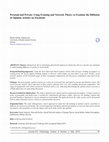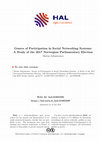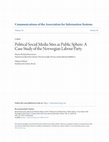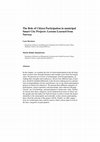Papers by Marius Rohde Johannessen
Shaping university ICT-related module curricula involves multiple stakeholders and formal and inf... more Shaping university ICT-related module curricula involves multiple stakeholders and formal and informal procedures. This paper identifies the main stakeholders of university curricula development and investigates how curricula are shaped. Based on semistructured interviews with university teachers at
Springer eBooks, 2010
In the Norwegian context, eParticipation in the form of online campaigning has been on the agenda... more In the Norwegian context, eParticipation in the form of online campaigning has been on the agenda since 2001. After Obama's successful presidential campaign in 2008, expectations about the use of SNS in the Norwegian parliamentary election were high. This study explores genres of participation in the early stages of the 2009 Norwegian parliamentary election campaign. The main finding is that the political parties have seen the need for a presence in SNS', and that a genre repertoire for political communication through SNS is beginning to evolve. However, there is little agreement between citizens and politicians about how the different genres should be enacted. Further work with genres is presented as a possible solution to lessening this communication gap.
På grunn av sviktende oppslutning om partier og valg er e-deltakelse er et svært aktuelt tema. E-... more På grunn av sviktende oppslutning om partier og valg er e-deltakelse er et svært aktuelt tema. E-deltakelsesprosjekter har ofte problemer med få deltakere, derfor ønsker man å undersøke hvordan sosiale medier kan brukes for e-deltakelse. Valgkamp på internett har vært et tema siden stortingsvalget i 2001. I 2008 hadde presidentkandidat Barack Obama stor suksess med å bruke sosiale medier i den amerikanske presidentvalgkampen. Av den grunn fokuseres det på deltakelsesformen” valgkamp”. Studiens problemstilling er” Hva er ...
Springer eBooks, 2015
In this paper, I apply framing theory to the online newspaper opinion articles that were most sha... more In this paper, I apply framing theory to the online newspaper opinion articles that were most shared and most liked in social media in 2014. The articles were published in two of Norway's largest and most influential online newspapers; Dagbladet.no and Aftenposten.no. Frame analysis makes visible how people define and construct a given issue, and as such can provide valuable input on how to write when you want a topic put on the political agenda. The findings show that the most popular opinion articles have one common theme: They are written in a personal tone, and aimed at our private sphere. The paper concludes by discussing what this means for agenda setting and for the public sphere.
Lecture notes in business information processing, 2019
The paper presents a case study on the use of open big data in the Norwegian Parliament. A set of... more The paper presents a case study on the use of open big data in the Norwegian Parliament. A set of policy documents was examined to find motivation for publishing open data. The case study was based on an examination of the parliament website, combined with document studies and interviews. The paper concludes that third parties have used open data to create new applications that generate value for their users. Applying our findings to the open government benchmarking framework, we identify some national barriers and possible solutions to further promote the use and publication of open data.
Springer eBooks, 2019
The first ePart conference was organized in Linz in 2009, co-located with the longer-running eGov... more The first ePart conference was organized in Linz in 2009, co-located with the longer-running eGov conference, which at the time was in its 7 th year. Since then, we have seen ten conferences focusing on eParticipation research. In this paper, we summarize these ten years by examining authors, keywords and prominent themes of the conferences. Our starting point is two early papers on eParticipation, which aimed to provide an overview and agenda for the field. We show how the eParticipation community addressed this agenda, and how the agenda has changed over a decade of eParticipation research.

Lecture Notes in Computer Science, 2014
Though substantial research efforts have been spent on understanding the role of political party ... more Though substantial research efforts have been spent on understanding the role of political party websites, there is a lack of in-depth knowledge concerning how such webpages are experienced by their users. In this paper, we present an interview study addressing users' experiences of political party websites. Eleven users of a political party website were interviewed to explore their experiences with this website in terms of its features for information, engagement, mobilization, and interaction. The study contributes new understanding of how different features of political party websites affect users' experiences. In particular, our findings shed light on the importance of high-quality informational content in political party websites for user engagement, and the role of features for interaction and dialogue relative to features for information. On the basis of our findings we offer lessons learnt relevant to the design and management of political party websites and suggest future research.

BMC Health Services Research, Apr 1, 2023
Background Low and lower middle-income countries suffer lack of healthcare providers and proper w... more Background Low and lower middle-income countries suffer lack of healthcare providers and proper workforce education programs, a greater spread of illnesses, poor surveillance, efficient management, etc., which are addressable by a central policy framework implementation. Accordingly, an eHealth policy framework is required specifically for these countries to successfully implement eHealth solutions. This study explores existing frameworks and fills the gap by proposing an eHealth policy framework in the context of developing countries. Methods This PRISMA-based (PRISMA Preferred Reporting Items For Systematic Reviews and Meta-Analyses) systematic review used Google Scholar, IEEE, Web of Science, and PubMed latest on 23 rd May 2022, explored 83 publications regarding eHealth policy frameworks, and extracted 11 publications scrutinizing eHealth policy frameworks in their title, abstract, or keywords. These publications were analyzed by using both expert opinion and Rstudio programming tools. They were explored based on their developing/developed countries' context, research approach, main contribution, constructs/dimensions of the framework, and related categories. In addition, by using cloudword and latent semantic space techniques, the most discussed concepts and targeted keywords were explored and a correlation test was conducted to depict the important concepts mentioned in the related literature and extract their relation with the targeted keywords in the interest of this study. Results Most of these publications do not develop or synthesize new frameworks for eHealth policy implementation, but rather introduce eHealth implementation frameworks, explain policy dimensions, identify and extract relevant components of existing frameworks or point out legal or other relevant eHealth implementation issues. Conclusion After a thorough exploration of related literature, this study identified the main factors affecting an effective eHealth policy framework, found a gap in the context of developing countries, and proposed a four-step eHealth policy implementation guideline for successful implementation of eHealth in the context of developing. The limitation of this study is the lack of a proper amount of practically implemented eHealth policy framework cases in developing countries published in the literature for the review. Ultimately, this study is part of the BETTEReHEALTH (More information about the BETTEReHEALTH project at https:// bette rehea lth. eu) project funded by the European Union Horizon's 2020 under agreement number 101017450.

Journal of e-technology, May 1, 2018
Using the most liked and shared opinion articles from Norway's leading newspapers as starting poi... more Using the most liked and shared opinion articles from Norway's leading newspapers as starting point, the article applies framing analysis to discover which frames are most likely to go viral. Further, social network analysis of the Facebook pages of these newspapers demonstrate the discussion communities and reach of the articles. Findings: The most popular opinion articles are written in a personal tone and aimed at private and domestic topics. The social network analysis shows that most of these articles generate their own, free-standing discussion communities. The range of engagement with articles posted on Facebook varies a lot, indicating that framing the opinion article correctly is of high importance for generating discussion. Research Limitations/Implications: The study is limited to one country and two mainstream newspapers. A larger variety in terms of geography and media types is needed for confirmation and future studies. However, the findings confirm that personal framing is important to receive attention in social media. The implications for the wider society can be interpreted both as democratization and as a threat to rational public discourse. Originality/Value: The study demonstrates a novel approach to study how the framing of opinion articles contribute to diffusion of content in social media. The research approach of framing and network analysis is a process that can be used by newspapers and journalists to track the impact and reach of the stories they publish.

Public administration and information technology, Jul 20, 2017
Transparency is seen as one important property of open government. The growing importance of gove... more Transparency is seen as one important property of open government. The growing importance of government transparency is shown through legislation being passed by most democratic countries during the last few decades. Transparency is based on legislation, regulations and other policy documents. Information and communication technology can help improving the transparency of political decision-making. In smart cities, technology can support transparency in a number of ways, ranging from making documents available online to transparency in the decision-making process. The purpose of this chapter is to provide government officials and other interested parties with an overview of the technologies that are available for transparency in smart cities, and to present lessons learned from cases the authors have been involved in. These lessons can be valuable for decision-makers working towards smart city developments.

IGI Global eBooks, 2020
The chapter presents a research design for examining social media use in political contexts, fram... more The chapter presents a research design for examining social media use in political contexts, framed as the methodology community case study. The main difference from a traditional case study is that the focus is on online communities rather than single organizations. The chapter presents the case study methodology along with the individual methods that have been applied in community case studies: interviews, stakeholder analysis, the Delphi method, social network analysis (and other digital methods), document, and genre analysis. The chapter concludes by discussing possible types of insights gained through applying these methods, and presenting a few example findings from previous research. The design has been successfully applied in the author's PhD thesis and later work, and is presented here in the hope that it might provide aid and inspiration for graduate students facing similar research problems.

Springer eBooks, 2018
Norwegian political parties have used the Internet for campaigning since 2001. In 2009 all the pa... more Norwegian political parties have used the Internet for campaigning since 2001. In 2009 all the parties represented in parliament experimented with social media, and in 2013 social media had become an important and integrated part of the parliamentary election campaign. This paper is a continuation of studies conducted in 2009 and 2013 on the communication genres used by political parties and voters during the campaign. In 2009, a genre system for political communication was emerging. In 2013 the genre system was more established and professionalised. This paper presents findings from the latest election in 2017, where there was concerns that the polarizing effects of Brexit, right-wing populism and the Trump campaign would influence online political communication during the campaign. The findings indicate that polarization is indeed part of the picture, but mostly when we view social media in isolation. The paper concludes by discussing the implications for democracy and the public sphere.

Information and communication technologies (ICT), including the Internet and a plethora of social... more Information and communication technologies (ICT), including the Internet and a plethora of social networking applications, are important for people with lifelong disability in their day-to-day life. Such technologies offer possibilities and opportunities for this group of people to enjoy a range of new social interactions. Through the internet, people with disability are able to meet and interact with other individuals who struggle with the same issues or meet people sharing their interests. Through this research, we compare empirically identified virtual world affordances for people with disability, to possible affordances offered by other social media. We introduce how other social media can offer some, but not all, of the same affordances. We introduce a conceptual model showing that the platforms with the richest social presence are more complex to use. This indicates that users to some degree will have to choose between the two. Nevertheless, virtual worlds and other social media offer new opportunities for people with disability to be a part of society and feel empowered in their lives.
Springer eBooks, 2022
Date of publication xxxx 00, 0000, date of current version xxxx 00, 0000.
Lecture Notes in Computer Science, 2022
In the Norwegian context, eParticipation in the form of online campaigning has been on the agenda... more In the Norwegian context, eParticipation in the form of online campaigning has been on the agenda since 2001. After Obama's successful presidential campaign in 2008, expectations about the use of SNS in the Norwegian parliamentary election were high. This study explores genres of participation in the early stages of the 2009 Norwegian parliamentary election campaign. The main finding is that the political parties have seen the need for a presence in SNS', and that a genre repertoire for political communication through SNS is beginning to evolve. However, there is little agreement between citizens and politicians about how the different genres should be enacted. Further work with genres is presented as a possible solution to lessening this communication gap.

Communications of the Association for Information Systems, 2014
Political interest and voter turnout is in steady decline. In an attempt to renew interest for po... more Political interest and voter turnout is in steady decline. In an attempt to renew interest for political matters, political parties and governments have attempted to create new digital meeting places, with the hope that social media can contribute to renew the public sphere and thereby increase political awareness in the population. Communicating in new media demands adaption to the culture of the new medium, and the networked nature of the Internet poses challenges to old ways of thinking as we can no longer talk about one public sphere but rather a networked public sphere consisting of a multitude of discussion spaces. In this article, we contribute to the understanding of the networked public sphere and online political communication through a case study of MyLaborParty.no, a social network run by a Norwegian political party. Our findings indicate that political parties can create a thriving part of the networked public sphere, as long as they invite opposing voices to the discussion, communicate using the genres which facilitate discussion and have users or moderators who help spread ideas between discussion spaces.

Springer eBooks, 2014
Online campaigning has been on the agenda of Norwegian political parties since 2001. In 2007, the... more Online campaigning has been on the agenda of Norwegian political parties since 2001. In 2007, there were some early attempts at online campaigning through social networking systems (SNS) during the municipal elections. 2009 was the first time SNS' were used for campaigning on a national level by all the political parties represented in parliament. This study follows up an earlier study of the 2009 election by examining the communication genres being used by Norwegian political parties in the 2013 parliamentary election. The 2009 study concluded that a genre system for online campaigning was emerging in SNS', and presented an overview of this system. This paper shows that the genre system is slowly moving towards an established system, and that while still not fully sorted out, previous issues, such as a lack of two-way communication, is being addressed by the parties. The study concludes that campaigning in SNS' is slowly moving more and more towards the objectives of politics 2.0.

Public administration and information technology, Sep 8, 2015
In this chapter, we examine the role of citizen participation in the development of smart cities ... more In this chapter, we examine the role of citizen participation in the development of smart cities through literature and example cases from Norwegian cities. We present an overview of technologies used for participation, including their strengths and weaknesses, discuss how different types of projects should be handled differently in the decision making process and present recommendations for how practitioners can set up citizen participation projects in Smart City initiatives. We present three different categories of participation, citizen experience and knowledge, data collection through citizens' use of technology, and participation as democratic value. Further, we discuss how these categories can be understood in terms of whom sets the agenda and who makes the final decisions in order to frame the project internally in the municipality and externally so that citizens participating know what the outcome of the project will be. Finally, we offer suggestions for technologies that could be used to collect citizen input in each of the three categories of participation..

International Conference on the Digital Society, Mar 22, 2020
This paper presents an evaluation of an eParticipation solution for rapid feedback and dialogue b... more This paper presents an evaluation of an eParticipation solution for rapid feedback and dialogue between citizens and politicians. The solution consists of a mobile application with survey-like functionality and a methodology for politicians' use of the app. We report the findings from our evaluation of a pilot study involving five Norwegian municipalities. Our findings clearly show that this type of solution has the potential to engage so-called lurkers and standby citizens to provide feedback on politicians' concrete issues. Further, the solution's complexity level places it between existing solutions for open/unstructured debate and more complex solutions. Both politicians and participating citizens report that they were happy with the pilot results and would like to continue using the solution. A test of an extended version of the solution is planned in 2021.











Uploads
Papers by Marius Rohde Johannessen